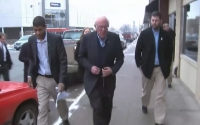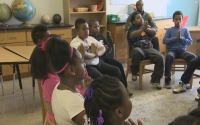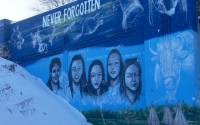Chicago’s Internet gangsters

“Right now, it’s just crazy,” says I.L Will. “It’s a million different groups. It’s everybody against everybody.”
I.L Will is a rising rap star in Chicago. He’s also one of the city’s estimated 70,000 to 200,000 gang members, broken into dozens of warring cliques. His own crew is called the K-Town Gangsters, affiliated with one of Chicago’s largest street gangs, the Gangster Disciples. Almost every clique in the city has their own I.L Will – the crew’s public face, who has the dangerous job of calling out rivals online.
Crews will produce music videos as often as every week in the exploding Chicago hip hop scene, known as “drill” music. The videos focus on the gritty realities of gang life, and serve as a place to claim drug turf, diss other cliques and threaten enemies. On YouTube or the enormously popular website WorldstarHipHop, the videos can fetch millions of views. Those named and disrespected in the videos then retaliate: sometimes with more videos, sometimes with guns.
'Talking crazy for nothing'
In the recording studio, members of I.L Will’s crew are on their smartphones. If they aren’t in the booth laying down lyrics, they’re posting pictures, sharing YouTube videos and tweeting.
Social media has become a dangerous new weapon in a world that runs on reputation, and where your livelihood is built on respect.
“People just be on there talking crazy for nothing,” says I.L Will.
“Facebook makes them feel like Superman,” a member of the crew chimes in. “Internet gangsters, that’s what we call them.”
People have more bravado on social media to flex their toughness and chew out rivals. And that flexing and chewing out is far more public than it ever was before.
“It’s fueling the violence because if you say something about me, and everyone sees you say something about me, that means you disrespecting me,” explains Shorty Capone, one of the most prolific drill music producers. “And if you disrespecting me, I can’t let you get away with disrespecting me. So you have to retaliate.”
Alvin Elmore
Music video director

In these music videos, an act of disrespect can be as simple as inverting the gang sign of another clique. “It’s sad, but when you live in these neighborhoods and you don’t have a lot to look forward to, that kind of thing means a lot to you,” says Alvin Elmore, Capone’s business partner.
Elmore estimates that a majority of the 500 homicides in Chicago in 2012 involved online feuds.
Even Instagram is a frontier in this war. One member of the Gangster Disciples received a message on Instagram that said, “When I see you in the streets N****, bang bang.”
“Goofy, trippin’. He doesn’t know what he is getting himself into,” the gangster tells America Tonight. “... You have to defend yourself, when you are put in a situation like this.”
Asked whether he would kill somebody over a comment like that, he replied: “Yeah, what else are you supposed to do?”....It’s like a cancer. You know a little piece of cancer get in your body. You go to the hospital and they get that little piece out. What we have here is a little piece of cancer.”
Later that day, the gang member was arrested for brandishing a gun in someone’s face and threatening to kill him.
LMAO
The most high-profile case of online beef spilling over into real-world violence involved the drill music pioneer and Interscope Records recording artist Chief Keef and an up-and-coming 17-year-old rapper called Lil JoJo. In 2012, Lil JoJo, who was affiliated with the Gangster Disciples, made a video mocking Chief Keef, a member of the rival gang the Black Disciples. As an extra stab, Lil JoJo filmed himself taunting a member of Chief Keef’s entourage. In the background, you can hear the guy shout back, “I’m gonna kill you.”
On Sept. 4, 2012, Lil JoJo tweeted the South Side corner he was standing on, and tagged Chief Keef’s crew. It was a challenge. A few minutes later, Lil JoJo was showered in bullets in a drive-by shooting and died.
@bcity79 @LilReese300 lmao im on 069 Stop The Fuckin flexin
— #OsoarrogantENT (@OsoArrogantJoJo) September 4, 2012Chief Keef denied involvement in the murder, but just hours afterwards, someone tweeted from his account: “Its Sad Cuz Dat N---- Jojo Wanted To Be Jus Like Us #LMAO.”
LMAO is slang for “laughing my ass off.”
Over the last decade, the arrests of top leaders have led to a fracturing of gang structures on the streets. No one is really in charge anymore. There can be rival cliques on almost every other block, and the violence has become much more random.
“I think what’s happened is, out there, the value of life is deteriorating,” Elmore says. “It’s like it doesn’t have as much value as much. Where you’ll see somebody die and then the person, they’ll laugh about it on Twitter.”
Feeling like a man
Videotaped reprisals are an increasingly popular means to settle a score. In one video, a young rapper named DJ Nate is blindsided by a rival artist named Nico Montana. Montana punches DJ Nate repeatedly, and forces his dazed victim to surrender his belt. The video was posted to WorldstarHipHop, where it received 180,000 views.
“Everybody wants to feel like a man,” Elmore says. “And nothing makes you feel more like a man than beating somebody up.”
In drill music videos, crews often brandish weapons and act out execution-style killings. Sometimes, in their lyrics, they’ll boast about having killed a man.
“A lot of people brag about how they’re a real gangster and how they kill some people,” Elmore says. “At first, I didn’t believe ‘em. But the death toll in Chicago’s gettin’ up so high, it’s like, maybe there’s some of ‘em are tellin’ the truth.”














Error
Sorry, your comment was not saved due to a technical problem. Please try again later or using a different browser.